Post Christmas in Bangkok & Escaping The Tsunami 2004
Wednesday, December 29th, 2004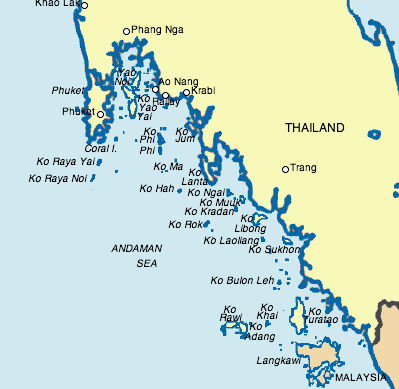
A month in Bangkok
On the morning of December 26, 2004, after a bowl of spicy Thai soup on the street outside my Bangkok hotel, I returned to my room and flipped on the satellite TV to find both CNN and BBC running astounding commentary and amateur video of the tsunami wave that had hit the Krabi coast earlier that morning. Son Doug and his wife Luk had been living on Khlong Muang beach 15 feet from the water in Krabi Province just SE of Phuket. The telephone circuits were all busy but after four tries and 30 minutes trying to reach them with my heart in my throat, Luk finally answered. What sweet voices that day!
About 10:30 that morning Doug and Luk had been in bed when they heard what they thought was a bomb. When he opened the curtains to the sliding glass doors, he instead found that it was the first wave of the tsunami that hit their glass doors facing the beach leaving the bungalow under water. They were lucky the doors were closed. Many lives were lost when water entered open doors and windows leaving people with no way to escape.
Doug said he immediately threw a bottle against the door of a sleeping couple behind their bungalow to wake them while Luk climbed screaming to the roof. Then when the first wave went back out, he and Luk scrambled to safety up the hill behind them.
When the 2nd wave washed detritus and some of their belongings back up on the beach, they made a little pile of stuff on the country road above the house. Doug had just sunk a lot of money into a cozy cafe/bar in front of his beachfront rental unit only to lose the whole investment…but not his life. He also luckily didn’t lose his new motorbike, that he retrieved as it was out swirling crazily in the 2nd wave.
They were able to quickly arrange for a friend with a pickup to take them and what was left of their belongings to a rental house farther inland on the road between Krabi Town and Ao Nang Beach and later to the island of Koh Samui.
About a week later, Bob appeared in Bangkok from wherever he was and he and I flew from Bangkok to Krabi Town…all of 6 people flying with us…not a good sign for the tourist industry here, I thought, as I stepped off into the humid tropical air. It felt very strange to be flying into the tsunami ravaged area on a colorful holiday plane. Son Doug and Luk, met us in the terminal…Luk, smiling, handed me a nicely wrapped gift. A friend that was in the Peace Corps in Thailand says the name “Luk” is an endearing name in Thai. She is a dear.
Krabi Province has about 500 people known to be lost so far to the tsunami. After spending a night in Krabi Town, a busy dusty town of about 18,000, Bob rented a motorbike and we moved about 30 kilometers up the coast to the beach town of Ao Nang.
On the way out of town we passed the Buddhist Wat that is providing space for a Krabi assistance and communication center under wide green awnings by the side of the road. Volunteers assist families looking for the missing on computer terminals. Color photos of the dead, disfigured and unrecognizable, and pictures of the missing cover rows of standing sheets of plywood. I was shocked and revolted by the appearance of drowned bodies. I had no idea they would swell like they do. Most of the photos of the dead attempt to show anything that may be identifiable by an intimate family member…a ring, a bracelet, a tatoo, a logo on a t-shirt…flowered undergarments…
Workers are still building several hundred wooden boxes that will be lowered with their contents into a mass grave in the cemetery beside the Wat. Driving along the roads in Krabi, here and there can be seen covered memorial areas with casket and flowers for funerals by some family members who have been able to identify their dead. We had been told that Krabi Province’s worst hit area is Khao Lak, farther north up the coast where the wave penetrated three kilomaters into the Mangrove forests and where people are still being found as debris is cleared. There are no plans to rebuild the area we are told.
The immediate crisis is over here in Krabi province. Smiling Thai people are some of the most positive people in the world and they are trying to make the best of a bad situation. They are not waiting for the wheels of international aid. Here in Ao Nang beaches are quickly being cleaned up…an attempt to salvage the devastated tourist high season. The local boat school is donating student workers and materials to repair about 50 damaged long-tail boats. A local company is donating time to desalinate long-tail motors. Boatmen are again taking what few tourists are left here out on diving expeditions and trips to outlying islands. Window glass is being replaced.
Patang Beach on Phuket Island had the most deaths and got the most publicity, but many beaches have been cleaned up already. It is indeed strange how one area could be hit hard and how the next area 10 feet away would not be damaged at all. Destroyed businesses and homeless families will get help.
But unfortunately, international coverage by CNN and BBC filmed the devastation to the exclusion of all the other areas which frightened away prospective tourists. On top of that, both Sweden and Denmark issued travel warnings so the tour companies have rescinded their travel insurance for those people…prompting travelers on two and three week holidays to return home. Restaurants and guesthouses here are empty. One restaurant owner told me that they have heard that some business owners will get some money to pay their rent but that still leaves them with little source of livlihood.
Koh Samui on the other side of the Thai peninsula, not hit by the wave, is packed at 100% capacity…only families getting hotel rooms and tents being set up on the beaches for backpackers. But here on the west side of Thailand, local expats and long term tourists are writing home and telling people if they really want to help now, to buy a plane ticket and come visit. If taking a vacation in SE Asia right now seems repugnant to you…as it did for us…think of the living here instead. The opposite side of the coin is the economic struggle of the survivors as they lose their source of income…60% of which comes from tourism. We are going to Phuket in a few days. Maybe the hospital there could use some help.

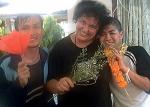
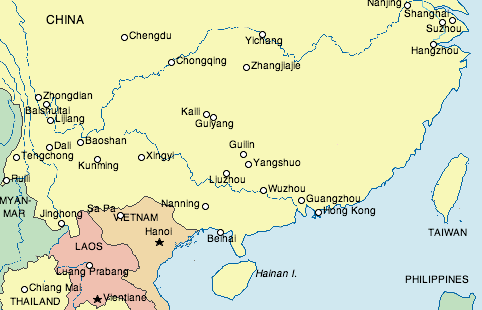
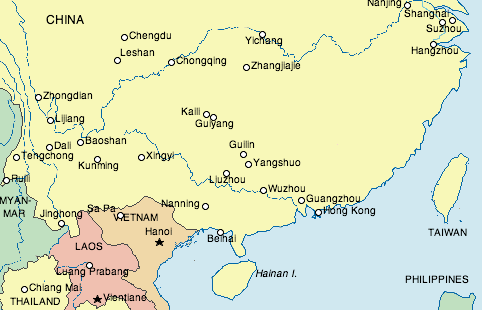 In Shanghai, exploring the Lonely Planet Thorn Tree web site, I noticed a query from a young woman from Kaili in Guizhou Province who was offering to arrange a homestay in a Miao minority ...
In Shanghai, exploring the Lonely Planet Thorn Tree web site, I noticed a query from a young woman from Kaili in Guizhou Province who was offering to arrange a homestay in a Miao minority ... 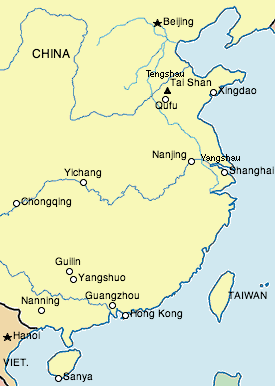 Spent about 3 weeks in Shanghai in a lovely small hotel behind the Shanghai Library on a tree-lined street of the former French Concession. The US Embassy was next door to the ...
Spent about 3 weeks in Shanghai in a lovely small hotel behind the Shanghai Library on a tree-lined street of the former French Concession. The US Embassy was next door to the ... 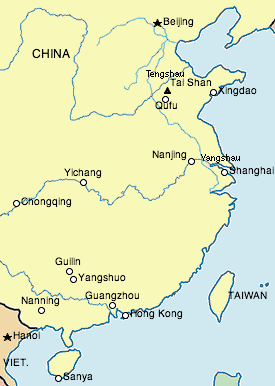 Currently in a delightful city (Yangshau) that is on the Yangtze River about 100 miles north of Shanghai.
China's autumn has been fantastic, the people interesting (and challanging) and the food tasty (most of ...
Currently in a delightful city (Yangshau) that is on the Yangtze River about 100 miles north of Shanghai.
China's autumn has been fantastic, the people interesting (and challanging) and the food tasty (most of ...